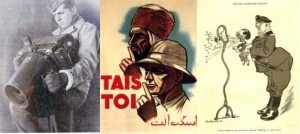Technologies of Truth: Propaganda, Ideology, and the Modern State
An Interdisciplinary Symposium
January 22, 2016

The rise of industrialized mass-societies predicated on notions of popular sovereignty transformed relationships between state power, ideology and the population. Modern propaganda is a product of this transformation. Under the old regime, the population was expected to acquiesce, obey, and fulfill its obligations. Belief was an attribute of the spiritual realm, embodied in religious institutions, whose representatives policed the boundaries of acceptable thought.
The doctrine of popular sovereignty undermined this division of labor and engendered a new set of imperatives. Rather than suppressing harmful ideas, it became necessary to propagate a positive set of beliefs that would resonate with the interests of power and ensure not only passive compliance, but active support. New modes of communication, such as the mass-circulation newspaper, public events, graphic arts, radio, film and eventually television, played a central role as tools in shaping mass consciousness.
In times of peace, varying interests competed to deploy these tools to advance programs ranging from the promotion of commercial products to campaigns for public health, moral reform, and political dominance. At moments of war and crisis, the state mobilized the tools of persuasive communication to inculcate a uniform worldview. Totalitarian parties and regimes, arising in the 1920s and 30s, extended this wartime mobilization of media and ideas into ordinary life, thus exposing populations to a continual torrent of information designed to inculcate a cohesive regime of truth.
This symposium will explore the processes and technologies underlying the phenomenon of modern propaganda, and provide a comparative view of the ways in which both state and non-state actors have strived to shape the popular mindset through the manipulation of ideas, images and emotions.
Program:
9:00-9:30 Coffee and Introduction
9:30-11:00 Panel 1: Evolution of Propaganda: USA/USSR
–Allan Winkler, Miami University, Propaganda Then and Now: The American Experience: Before During, & After World War II
–Stephen Norris, Miami University, Wielding the Weapon of Laughter: Boris Efimov and Soviet Political Propaganda, 1922-1991
–Chair: Nathaniel Knight
11.00-11:15 Coffee Break
11:15-12:45 Panel 2: Transformations in the U.S. WW II Visual Narrative
–Thomas Doherty, Brandeis University, The Moguls vs. The Senators: The Committee on Interstate Commerce Investigation of Propaganda in Motion Pictures, 1941
–James J. Kimble, Seton Hall University, Spectral Soldiers: Domestic Propaganda, Visual Culture, and Images of Death on the World War II Home Front
–Chair: Larry Greene
1:30-3:00 Panel 3: British Anti-Communism in Iraq; Soviet Anti-Racism at Home & in USA
–Elizabeth Bishop, Texas State University, Law 51 (and other Technologies of Truth) in Hashemite Iraq
–Meredith Roman, State University of New York at Brockport, Soviet Attacks on U.S. Racial Apartheid and the Creation of the New Anti-Racist Man and Woman
–Chair: Murat Cem Menguc
3:00-3:15 Coffee Break
3:15-4:45 Panel 4: Mass Nationalism and Mass Marketing at Home and Abroad
–Maria Snegovaya, Columbia University, Assessing Russia’s Propaganda Abroad
–James P. Woodard, Montclair State University, Creating Big Brazil: Business, Marketing, Mass Nationalism under Military Rule, 1969-1974
–Chair: Maxim Matusevich
4:45-5:00 Coffee Break
5:00-5:30 Closing Remarks and Roundtable Discussion
–Chair: Mark Molesky
